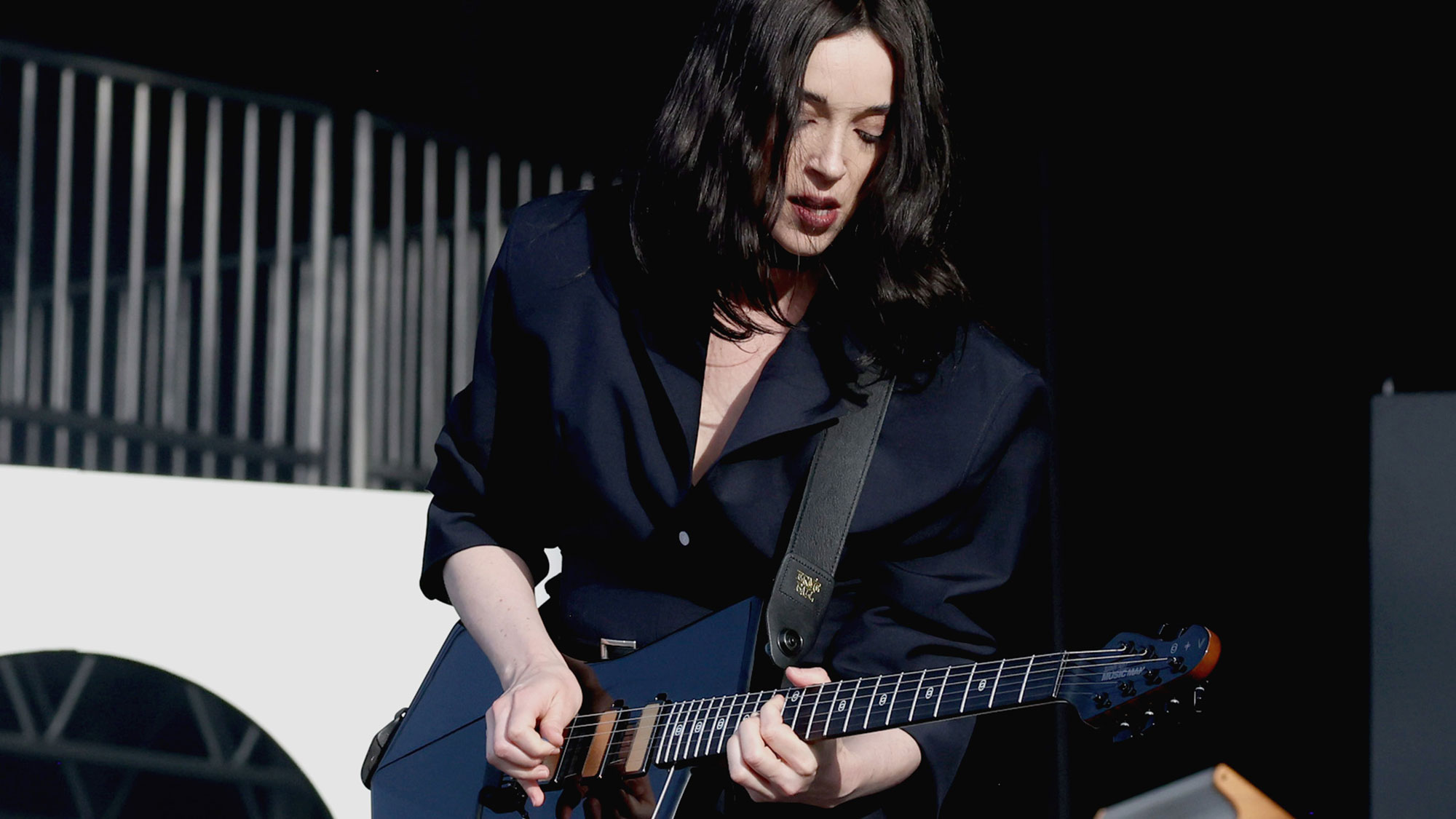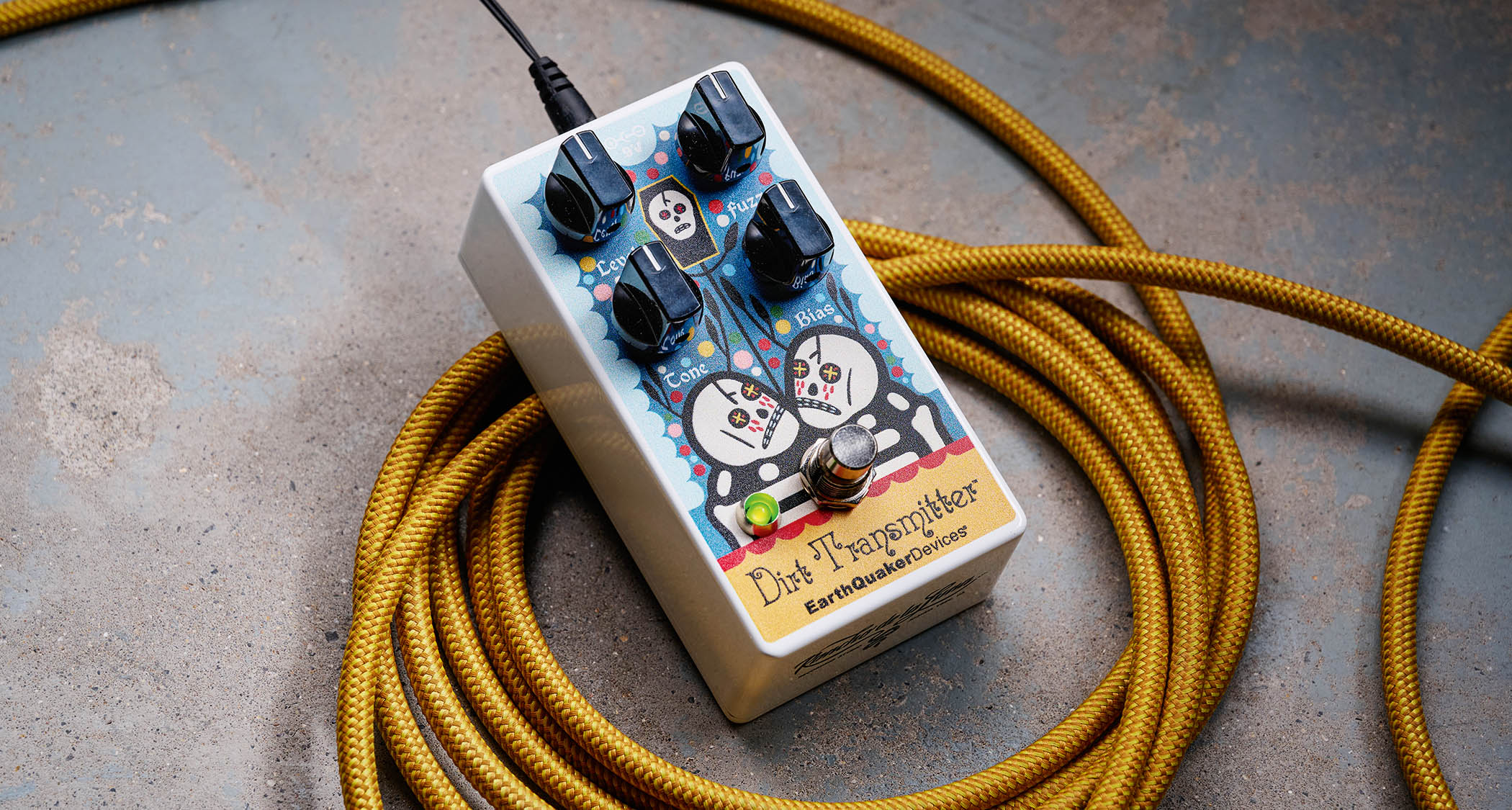“Guitar’s versatility is unparalleled. But it’s also an instrument with a lot of baggage. We all know the tropes we’re trying to avoid”: St. Vincent on returning to real amps, stealing Josh Homme’s secret weapon – and how she overcame her fear of Strats
St. Vincent’s new album, All Born Screaming, sees her teaming up with two Foo Fighters, using Prince’s favourite pedal and embarking on a prog odyssey. It also sees her return to real amps played real loud…

Annie Clark – aka St. Vincent – is finished, for now at least, with digital guitar tones. “I’ve done enough direct guitar sounds,” she declares. “I wanted to move some air again.” The result helps St. Vincent’s latest album, All Born Screaming, sound extremely human. “It sounds real because it is real,” Annie says of the record’s emotional content, but she could also be talking about the Marshall she used to express some of those emotions.
When she wrote this record, Clark explains: “I personally was metabolising inward and outward violence. How do you make sense of the human condition? It’s wild and fraught. I’m lucky in the way I get to try to make sense of everything, by making work that takes chaos and puts it into some kind of order, whether that’s literally, with electricity through circuitry, or in more esoteric ways.”
“Every record I make is just a direct reflection of what’s happening in life,” she continues. “I’m not really deconstructing persona or identity this time. That’s not really where my head is at. It was more, ‘Okay, life is very short. It’s in some ways very binary. You are alive or you are dead, and there’s not an in between. So if you’re alive, let’s go. Let’s live…’”
Living things need to breathe, and the guitars on the record mirror that, with roomy, ambient sounds. The vibey guitar licks on Big Time Nothing, for example: “That is my Music Man Goldie signature guitar through a reissue Marshall cranked in a room, with two Coles stereo ribbon mics for room sound.”
All Born Screaming sees Clark self-producing for the first time. Although guitar is central to what she does, it’s just one of many instruments she plays. Wearing all those hats means she must decide not just what to play, but whether to play at all.
“I don’t mean to sound like a total space cadet,” she smiles, “but I think the song tells me if guitar needs to happen.” Her position as songwriter and producer informs her thinking about every part of the process.
When we ask about the guitar gear on the album, she includes what mics she used on guitar cabinets (C12s and SM57s) and even mentions her Neve Decca mixing console. Where most guitarists imagine their signal path starting at the strings and ending at the amp, for Clark it seems to begin in her brain and end in the listener’s, encompassing everything between.
All the latest guitar news, interviews, lessons, reviews, deals and more, direct to your inbox!
Clark’s gear obsession is evident. “I’m happy to nerd out any day!” she cries, volunteering her favourite pick, but she values gear for its creative uses.
She describes pedals with creative adjectives like “gnarly” and “kaleidoscopic” rather than technical descriptions of what they do, but wearing her producer’s hat, she also knows the technical stuff. “Say, with a 500 millisecond delay. You gotta know what that equals in quarter notes and eighth notes,” she insists.
“There’s always going to be that guitar player ego going, ‘Put me in, coach! Hey! What about guitar? What about guitar?’ Sometimes guitar is exactly what needs to happen, and sometimes guitar is just not on the cards,” she shrugs.
“One must be strong in their resolve, not to put guitar on things that don’t need guitar! But that also means that you try and be as innovative as possible when there is guitar.”
An amp cranked up in a room – that’s a real sound
Sometimes that innovation means layering guitars with synths or unusual bass tones to create sounds that are both familiar and new:
“The real nastiness on the song Flea comes from the bass,” she says. “Justin Meldal-Johnson played that bass clean, but I distorted it. I’m not one to go, ‘Oh, to make a big chorus, I’ll put eighth-note distorted guitars over it.’
“In the midrange, by the time you have Dave Grohl on drums and Justin’s bass, all the guitars need to do is be this riffy, seasick, out-of-tune EBow choir, and that’s the thing that will give you the additional harmonic information. It’s fuzzy, because the EBow has a has a built-in buzz to it.”
Wait a second… who on drums?
“We’ve been buddies since I helped induct Nirvana into the Rock and Roll Hall of Fame,” Annie tells us. “I just hit him up and was like, ‘There’s a song called Flea and you’re the only person I could hear on it!’
“He’s a great drummer because he’s a great songwriter. He has all the power and all the chops, but everything he does serves the song. He’s just gonna take the song from a nine to a 21!
“He just brings that kind of power, but it’s never ego-blowing. He just came over, knew the song inside and out, every turn. He probably only heard it three or four times but he just had it.” New Foo Fighter Josh Freese also supplies drums on a further two tracks, Hell Is Near and So Many Planets.

Despite the presence of those rock giants, All Born Screaming makes us think mainly of Prince, to whom St. Vincent paid tribute at the 2020 Grammy Salute. It’s not that it sounds like a Prince record, although there’s a deep funk influence worthy of the Purple One.
It’s that they are both such polymaths – producers, songwriters, and multi-instrumentalists – who nevertheless keep guitar at the forefront of their sound. Both are far better guitarists than they ought to be, given their breadth of other talents, and both have threaded the needle of maintaining artistry and musicianship alongside commercial success.
And they share a favourite pedal: “On the songs All Born Screaming and Inverse To This, I recorded my Roland JC-40 with a Boss VB-2, the original one,” she says. “You know, Prince’s vibrato pedal. He only played Boss pedals.”
Also like Prince, Clark displays an engagingly non-linear thought process. “If I had to name my favourite bass tone ever, I would say Chris Squire from Yes on Close To The Edge. That is a perfect bass tone,” she asserts at one point, apropos of nothing. “I know you did not ask me that question!”
This is not the only time Yes come up for conversation. She also refers to the instrumental section of Flea as “my Yes prog odyssey”.
That prog odyssey is powered by two pedals that use sampling in innovative ways. The first is the Hologram Microcosm, also beloved of Covet’s Yvette Young, which combines pitch-shifting, delay, and looping. “It was for that kaleidoscopic delay trail,” Annie explains.
The other is the Cooper FX Outward, which she likes “for gnarliness”, admitting: “I don’t even know what it does! It just makes everything sound melted and gnarly, just disturbing.”
All Born Screaming also sees St. Vincent delivering supremely tight funk guitar parts. “The guitars in Big Time Nothing are very much in the pocket, which is nice. You gotta have that pocket!” she grins.
Funk tones are powered by the Roland JC-40, while the Marshall takes care of dirty tones for things like Broken Man. “It sort of is and isn’t enormous,” she reflects. “I think the attack feels punchy and aggressive, but it’s not like I put a big fuzz pedal on it. It’s almost a little bit more spanky of a tone, which is why it feels more aggressive.”
I’ve typically been afraid of Strats just because they carry so much baggage, but there were certain songs on this record that was like, ‘A Strat is exactly what needs to happen here, so a Strat it shall be!’
“Mike McCready from Pearl Jam gave me one of his amazing signature Strats,” Annie reveals, “and I played that on the record a bit. I’ve typically been afraid of Strats just because they carry so much baggage, but there were certain songs on this record that was like, ‘A Strat is exactly what needs to happen here, so a Strat it shall be!’
“The end of the big riff on Broken Man was that Strat. I was just playing it as aggressively as possible. I play with my fingers most of the time, but I think I played that with a pick. My pick of choice is the Ernie Ball nylon light (0.53mm).
“Using pedals on a Strat, you just have to be conscientious of avoiding unpleasant brightness, so that’s all from the amp. That’s it. An amp cranked up in a room. Not to be corny, but that’s a real sound.”
She adds: “There may be a couple EBow parts that are direct to the console, or run through a pedal chain and then direct. Other than that, it’s all air coming through speakers.”

There’s also an unlikely third amp: “Cian Riordan, who recorded a lot of the record and mixed it, let me borrow his Peavey Decade.”
The Decade is a previously unloved 10-watt solid-state affair whose second-hand prices shot from $50 to $500 after Josh Homme described it as his “secret weapon” in a 2020 Mark Ronson documentary. “It’s a Homme homage,” Clark confirms, though she can’t remember precisely where on the record it ended up.
The main guitar on the album is the Music Man Goldie, the latest edition of her signature model. It’s so named because of its gold foil pickups, which ape the appearance and vibe of the budget single-coils on 1950s Teiscos and DeArmonds. Unlike those models, however, the Music Man pickups are hum-cancelling.
“It has a little bit more of a midrange brightness that I was going for,” she explains. “That was especially nice with the amp and room sound.”
Other guitars on the record include a Gretsch 12-string on opener Hell Is Near, and a Telecaster strung in Nashville tuning (standard tuning, but with the low E, A, and D strings one octave higher) on Big Time Nothing.
Annie’s favourite guitar moment on the album comes near its end: “There’s a solo in So Many Planets that I’m fond of. That song is my love letter to second-wave ska and 2-Tone Records.
“I thought I was totally aping The Specials’ Man At C&A, and then I went back and listened to it and realised, ‘Oh, no I wasn’t.’ Usually when you reference things, you’re only really referencing your memory of the feeling that you had when you last heard something, you’re not literally referencing it.”
Another favourite moment comes in the aforementioned Flea. “I take a kind of solo in the chorus that reminds me of listening to Butthole Surfers in Dallas in 1997. I was going for a sound where it’s like… wrong? Like, ‘Is this person virtuosic, or do they totally suck? That’s kind of where I live.
“Like, one of the great guitar solos, Neil Young’s Down By The River is, what, one note? So it’s just in the hands of the beholder, I think.” She laughs: “That’s not an expression!”
St Vincent’s brain is firmly planted in the here and now. We invite her to speculate where her music might be headed next, but she declines to think beyond the next day: “Tonight, I’m going to play a benefit. I’m going to play this classical guitar that I tune down to C. I’m going to put it through a couple of chorus and vibrato pedals into a JC-40, and play Moon River and have a really fun time.
“I’ll be playing very delicately and playing chords with lots of numbers behind them, you know what I mean? After that, I don’t really know…”
She muses: “Guitar is interesting, because its versatility is unparalleled. But it also is an instrument with a lot of baggage. We all know the tropes that we’re trying to avoid. There’s a fine line between, ‘Wow, that’s amazing and virtuosic, and I love it!’ and, ‘That’s an act of ego and not an act of art!’ It’s a really funny balance.”
- All Born Screaming is out now on Total Pleasure/VMG.
Jenna writes for Total Guitar and Guitar World, and is the former classic rock columnist for Guitar Techniques. She studied with Guthrie Govan at BIMM, and has taught guitar for 15 years. She's toured in 10 countries and played on a Top 10 album (in Sweden).




